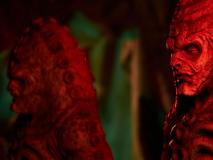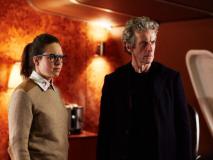Christopher Barry 1925 - 2014
Monday, 10 February 2014 - Reported by Marcus
 Veteran director Christopher Barry has died at the age of 88.
Veteran director Christopher Barry has died at the age of 88. Christopher Barry was responsible for some of the most admired stories from the classic series of Doctor Who, where he was the longest serving director, responsible for 43 episodes spanning the years 1963-1979. He directed all of the first four Doctors - one of only three directors to do so.
He joined the Doctor Who team in the late summer of 1963, when he was assigned to direct the second story, The Daleks, replacing Rex Tucker who had left after artistic differences with producer Verity Lambert. The script he would bring to life would see the introduction of the Daleks and ensure the success of the fledgling series. Barry would end up directing episodes 1,2,4 and 5 of the story, creating the 'sink-plunger' cliff hanger at the end of episode 1 which would see the nation on the edge of their seats until the full revelation of the Dalek machine in episode 2. He was in the studio directing episode 2 when the news of President Kennedy's assassination broke.
Barry returned to the series a year later, directing The Rescue, the story which saw the introduction of the first new companion since the series start, Vicki, played by Maureen O'Brien. He stayed on to direct the next story The Romans, a historical romp which saw much more humour introduced to the series. Having introduced a companion, his next Doctor Who assignment was to see the departure of another, as his final story with William Hartnell, The Savages, was to be the last story to feature Steven Taylor, as played by Peter Purves.
In 1966, Barry masterminded the introduction of a new Doctor, when he directed Patrick Troughton's first story, The Power of the Daleks. The story, long missing from the archives, had the difficult job of introducing a new lead actor to the series and cementing the long term success of the series.
His next outing was with the third Doctor, Jon Pertwee, when he directed the 1971 story The Dæmons. Long regarded as a classic, the story is often cited as a favourite by members of the cast and production team. Barry returned the following year to direct the six part story The Mutants.
Having overseen the debut of one Doctor in 1966, Barry was able to do so once again when, at the end of 1974, he directed Robot, introducing the world to the man who would become the longest-serving (continuous) on-screen Doctor - and arguably the most famous in the public eye from the 'classic' era - Tom Baker. The story was one of the first with all location work recorded direct onto video tape using a BBC OB unit. The following year he directed another classic, The Brain of Morbius, which saw the fourth Doctor encounter the eccentric surgeon Solon and his Time Lord secret. It was in this story Barry featured on screen alongside other production team members as one of the faces projected onto the screen during the Doctor's mind battle with Morbius.
Barry's final story for classic Doctor Who came in 1979 when he directed the four part story The Creature from the Pit, with the DVD release of that story containing a retrospective of his work. While the series was off air he also directed the 1995 story Downtime, a direct-to-video story produced by the independent production company Reeltime Pictures.
He began his film and TV career in the movies, working as an assistant director on star vehicles including Meet Mr. Lucifer (1953), The Love Lottery (1954) and The Ship That Died of Shame (1955). By 1958 he was directing, working on the BBC’s Starr and Company, the crime drama Private Investigator and the long-running soap opera Compact. He directed episodes of Paul Temple, Moonbase 3, Poldark, Angels, Nicholas Nickleby, The Onedin Line, Z Cars, All Creatures Great and Small, Nanny and Juliet Bravo. He also directed eleven episodes of the TV adaptation of John Christopher's The Tripods.
UPDATE - 16th FEBRUARY: It has emerged that Barry died on Friday 7th February after falling down an escalator at a shopping centre in Banbury, near his home in Oxfordshire, earlier that day. He was taken to hospital but while there he suddenly stopped breathing and doctors could not revive him. An inquest into his death will be held on Thursday 5th June.
Obituaries: The Guardian (17 Feb 2014); The Independent (19 Feb 2014); BBC News Magazine (4 Mar 2014)


 Silva Screen have been nominated for an International Film Music Critics Association Award for the 2013 release of Doctor Who: The 50th Anniversary Collection
Silva Screen have been nominated for an International Film Music Critics Association Award for the 2013 release of Doctor Who: The 50th Anniversary Collection The nomination is for BEST ARCHIVAL RELEASE OF AN EXISTING SCORE – COMPILATION
The nomination is for BEST ARCHIVAL RELEASE OF AN EXISTING SCORE – COMPILATION

 Tomorrow's episode of ITV drama Midsomer Murders sees an
Tomorrow's episode of ITV drama Midsomer Murders sees an  The BBC has had to correct itself over the make of boots being worn by
The BBC has had to correct itself over the make of boots being worn by 















